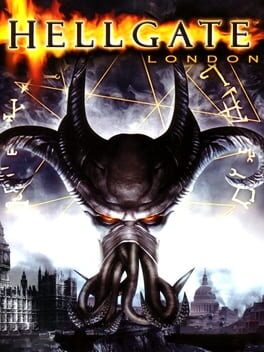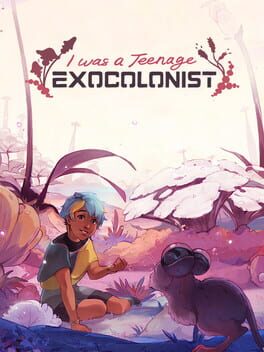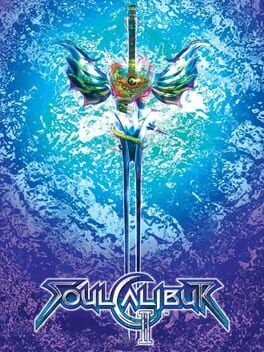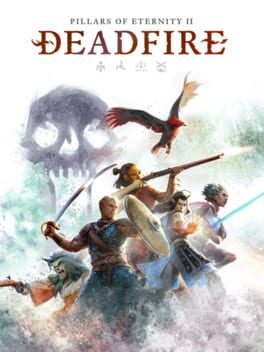MonaLisaOvrdrive
Bio
they/them
they/them
Badges

GOTY '23
Participated in the 2023 Game of the Year Event

Pinged
Mentioned by another user

Well Written
Gained 10+ likes on a single review

Liked
Gained 10+ total review likes

Noticed
Gained 3+ followers
Favorite Games
009
Total Games Played
000
Played in 2024
000
Games Backloggd
Recently Reviewed See More
the games master (or dungeon master) has long been one of the most fascinating roles one can play in any game - be it video, table, or sport. a blend of one-person theatre, moderation, improvisational comedy, and game design, with the emphasis on these roles and others besides shifting from person to person, from table to table, it's a truly unique position, and it's perhaps the key thing that makes computer role-playing fundamentally different from tabletop role-playing, even if you're still playing with friends. when a game is your dungeon master, it becomes non-negotiable, unwavering, utterly fastidious, and miserly in its rule-keeping. this is not always a problem if the rules are strong enough - i'm not especially interested in playing a game of Go with a referee who's cool with me eating the opponent's pieces when they aren't looking, except maybe as a one-off - but when the rules are not strong enough, it leaves me craving the human hand of a DM who will gently massage the systems behind the scenes to ensure everyone involved is having fun. and in Fifth Edition, the rules are, assuredly, not Strong Enough.
Fifth Edition Dungeons & Dragons is, bluntly, a poor TTRPG that demands a level of simulationist interest that would bore a 40K player (quick question, has anyone who has ever played 5E ever gave a shit about the carry weight of currency? did you even know that the gold you're carrying around has a weight that you're supposed to manage?) as support to a tactical game that is as shallow as it is torturously prolonged, capped by a social game that is functionally nonexistent. D&D is content to coast by on its cultural ubiquity and the fact that almost all of its player base barely even really knows that other TTRPGs exist, sailing the seas of mediocrity on a boat that starts to sink if you set foot in it for more than a few minutes. it is possible to play wonderful games in D&D, but I have yet to hear of - or be part of - one that was wonderful because it was D&D - rather, they are invariably good in spite of D&D, and always require some degree of selective memory or active rejection over many of the game's outrageously numerous rules.
given this perspective, it's perhaps not surprising that i am not enormously enthused by larian studios' Baldur's Gate III, a game that attempts to faithfully adapt the 5E rules to the broad framework of the studio's last game, Divinity: Original Sin II. but even with that in mind, i find myself genuinely shocked at how unbelievably boring BG3 is.
as the soothsayers on the mount foretold would occur the instant Larian proudly announced their design intentions, marrying 5th Edition Dungeons & Dragons to Divinity Original Sin 2's combat completely hamstrings the latter: the genuinely expressive and reactive toolkit of that game is filtered through a dull interpretation of the most stock spells of 5E, making this less a game of setting up a simple rube goldberg machine to defeat an encounter, and more about tediously playing out the motions of early-game dnd in a world your imagination cannot penetrate.
here's the trick to being a DM: let the players do the hard work. if they come up with a crazy scheme that you never imagined that just might work... who's to say it can't? you and the players are telling this story together, after all. if they want to say what happens next, let them. if they ask if there is a chandelier to swing on, say yes. constraining yourself to a number of set solutions you devise and hope the players find is only making the game less interesting for everyone involved. when the world exists only in your heads, it expands at the speed of thought. anything is possible.
while baldur's gate 3 is a more permissible dungeon master than some games, it remains a prisoner of the imaginations of it's designer. and this is hardly a fair critique to make of a video game, i know...except when it's playing with a ruleset explicitly designed with a lackadaisical, easygoing dungeon master in mind. damning as it might be to say, the easiest way to see the failings of 5E as a set of rules is to play by them, and BG3 offers you no choice but to do so, but without even some crucial features like Ready Actions that narrow it's tactical space even more. original sin 2 nobly wrestled with this thanks to an expansive spell set mostly based on reactions and creating situations, and one wherein you could be doing powerful things very quickly. 5E has so little of this, by comparison, especially in the miserable early levels. all you have is some of the weakest tactical combat in table gaming. and explosive red barrels, of course.
the designers are clearly aware of the reduced capability for the player to interact with the environment, and have accordingly given most major encounters one big object to interact with and defeat enemies with, be it one of the aforementioned red barrels, or a giant rock suspended by a rope above where two men are standing, etcetera. this is, definitionally, reactivity in action, i suppose, but is about as intellectually engaging as putting square pegs in square holes: there's a reason we don't hold a party for every first-person shooter with an explosive barrel in it, why are we holding a party for this one?
it certainly can't be the early-game writing. while certainly I'm gratified that BG3 is less outwardly annoying and in-poor-taste as Divinity 2's edgelord parade, it's seemingly forgotten to replace it with much of anything. BG3's player character must surely be one of the most boring in the entire genre, with nary a hint of personality escaping their suffocatingly matter-of-fact dialogue options, that only on occasion dare to be so bold as to allow the player to be...slightly rude or sarcastic. there's never going to be a CRPG that allows for as much reactivity and input as a dungeon master of flesh and blood, but even within those expectations, BG3 falls utterly flat. so much of the appeal of this genre, to me, is in creating a guy that you can rotate around in your head. but baldur's gate 3 is the kind of DM that is only interested in a PC for the Numbers on their character sheet: the actual Character of the Player Character ceases to be once you complete their creation, and let them loose from your imagination into the confining reality of BG3's world.
(incidentally, BG3 joins CyberPunk 2077 in the prestigious world of 'Games With Character Creators That Give Me Chaser Vibes' with their insistence on embodying transness exclusively via mixing-and-matching voice and genitals on a series of binary traditionally attractive male or female body types. i genuinely appreciate the ability to play as a non-binary character: i don't appreciate the unavoidably fetishistic nature of prioritizing genital customization over any actual input on everyday trans presentation, like binders, top surgery, or even an androgynous voice or two)
with only a solid day's of gameplay under my belt, i can't in good conscience claim to have the full scope of the game's companions, i can at least say that the first impressions they make fall within tiresome cliches we've all had our fill of, i think. or have we? have you?
this is my conundrum with baldur's gate 3. i truly do not think the game is remarkable in any meaningful way: it is not awful but it is a very bog-standard CRPG with a little more messing with the set dressing than is typical for the genre. it is narratively, and mechanically, rote. i have only spent a few hours with it, and already, i am tired of it. just as i am tired of dungeons & dragons.
but maybe you aren't. maybe you haven't played baldur's gate 1 or 2, maybe you haven't played darklands or torment, maybe you haven't played arcanum or underrail. maybe you haven't played pillars of eternity or tyranny. maybe you're someone who got into D&D via Critical Role's explosion, someone who has never played a CRPG quite like this before, and are being introduced to an entire sub-genre with the first true 5E-based CRPG. maybe you still think jokes about Bards fucking Dragons are really funny. i say this with true sincerity (well, maybe not the last one, which was a little mean, and for which i apologize): i am genuinely delighted, on some level, to see a CRPG get this popular. while i truly cannot explain the swathes of industry veterans giving into astonishment on a scale undreamed of with this game, i also know that d&d is much, much bigger than it was when i was first enthralled by dragon age: origins, a game with a similarly rote plot, and still captured by heart and imagination, and that if this is your introduction to the magic of CRPGs, i can see why you give into astonishment. because crpgs can be astonishing.
but i would like for it, and D&D as a whole, to remain an introduction, to not consume the entire conception of the hobby, as D&D has. i am sincerely and genuinely disappointed with the total lack of apprehension the wider critical scene of games has for BG3, given its connection to Wizards of the Coast, a deeply evil company that, just today, admitted to using AI art in the latest D&D sourcebook. i am uninterested in contributing to the breathless hype of an IP owned by a company uninterested in the basic humanity of art and it's creation. not when there are so many other games out there.
you can stay in plato's cave, for a while. you can stay there forever if you want, dungeon crawling up and down the sword coast. but you can also leave that cave, and come into my other cave, slightly next door, where i can tell you about blades in the dark and pentiment. they're really very very cool.
as for me? i turned the game off when i reached a point whereupon, after noticing an obvious trap, i snuck around the skeletons lying in wait to attack and reached the treasure...whereupon the treasure chest spoke to me and told me to fuck off until i had killed the skeletons. fuck off, BG3. why should i bother trying to navigate your encounters creatively when you're going to just say that it doesn't work like that? I've played with dungeon masters like this before, and they aren't good ones. they're the kind of ones who wonder why they can't seem to hold a group together for more than a couple of sessions.
maybe i'll return to BG3, but if i do, it'll only be in multiplayer. with friends, and possibly a drink or two. but if me and three friends are committing to a possible 120-hour RPG...why not just take it a little bit further and just play some actual Tabletop? Why not play something that isn't Dungeons & Dragons? Why not play with a dungeon master that won't be such a spoilsport?
Fifth Edition Dungeons & Dragons is, bluntly, a poor TTRPG that demands a level of simulationist interest that would bore a 40K player (quick question, has anyone who has ever played 5E ever gave a shit about the carry weight of currency? did you even know that the gold you're carrying around has a weight that you're supposed to manage?) as support to a tactical game that is as shallow as it is torturously prolonged, capped by a social game that is functionally nonexistent. D&D is content to coast by on its cultural ubiquity and the fact that almost all of its player base barely even really knows that other TTRPGs exist, sailing the seas of mediocrity on a boat that starts to sink if you set foot in it for more than a few minutes. it is possible to play wonderful games in D&D, but I have yet to hear of - or be part of - one that was wonderful because it was D&D - rather, they are invariably good in spite of D&D, and always require some degree of selective memory or active rejection over many of the game's outrageously numerous rules.
given this perspective, it's perhaps not surprising that i am not enormously enthused by larian studios' Baldur's Gate III, a game that attempts to faithfully adapt the 5E rules to the broad framework of the studio's last game, Divinity: Original Sin II. but even with that in mind, i find myself genuinely shocked at how unbelievably boring BG3 is.
as the soothsayers on the mount foretold would occur the instant Larian proudly announced their design intentions, marrying 5th Edition Dungeons & Dragons to Divinity Original Sin 2's combat completely hamstrings the latter: the genuinely expressive and reactive toolkit of that game is filtered through a dull interpretation of the most stock spells of 5E, making this less a game of setting up a simple rube goldberg machine to defeat an encounter, and more about tediously playing out the motions of early-game dnd in a world your imagination cannot penetrate.
here's the trick to being a DM: let the players do the hard work. if they come up with a crazy scheme that you never imagined that just might work... who's to say it can't? you and the players are telling this story together, after all. if they want to say what happens next, let them. if they ask if there is a chandelier to swing on, say yes. constraining yourself to a number of set solutions you devise and hope the players find is only making the game less interesting for everyone involved. when the world exists only in your heads, it expands at the speed of thought. anything is possible.
while baldur's gate 3 is a more permissible dungeon master than some games, it remains a prisoner of the imaginations of it's designer. and this is hardly a fair critique to make of a video game, i know...except when it's playing with a ruleset explicitly designed with a lackadaisical, easygoing dungeon master in mind. damning as it might be to say, the easiest way to see the failings of 5E as a set of rules is to play by them, and BG3 offers you no choice but to do so, but without even some crucial features like Ready Actions that narrow it's tactical space even more. original sin 2 nobly wrestled with this thanks to an expansive spell set mostly based on reactions and creating situations, and one wherein you could be doing powerful things very quickly. 5E has so little of this, by comparison, especially in the miserable early levels. all you have is some of the weakest tactical combat in table gaming. and explosive red barrels, of course.
the designers are clearly aware of the reduced capability for the player to interact with the environment, and have accordingly given most major encounters one big object to interact with and defeat enemies with, be it one of the aforementioned red barrels, or a giant rock suspended by a rope above where two men are standing, etcetera. this is, definitionally, reactivity in action, i suppose, but is about as intellectually engaging as putting square pegs in square holes: there's a reason we don't hold a party for every first-person shooter with an explosive barrel in it, why are we holding a party for this one?
it certainly can't be the early-game writing. while certainly I'm gratified that BG3 is less outwardly annoying and in-poor-taste as Divinity 2's edgelord parade, it's seemingly forgotten to replace it with much of anything. BG3's player character must surely be one of the most boring in the entire genre, with nary a hint of personality escaping their suffocatingly matter-of-fact dialogue options, that only on occasion dare to be so bold as to allow the player to be...slightly rude or sarcastic. there's never going to be a CRPG that allows for as much reactivity and input as a dungeon master of flesh and blood, but even within those expectations, BG3 falls utterly flat. so much of the appeal of this genre, to me, is in creating a guy that you can rotate around in your head. but baldur's gate 3 is the kind of DM that is only interested in a PC for the Numbers on their character sheet: the actual Character of the Player Character ceases to be once you complete their creation, and let them loose from your imagination into the confining reality of BG3's world.
(incidentally, BG3 joins CyberPunk 2077 in the prestigious world of 'Games With Character Creators That Give Me Chaser Vibes' with their insistence on embodying transness exclusively via mixing-and-matching voice and genitals on a series of binary traditionally attractive male or female body types. i genuinely appreciate the ability to play as a non-binary character: i don't appreciate the unavoidably fetishistic nature of prioritizing genital customization over any actual input on everyday trans presentation, like binders, top surgery, or even an androgynous voice or two)
with only a solid day's of gameplay under my belt, i can't in good conscience claim to have the full scope of the game's companions, i can at least say that the first impressions they make fall within tiresome cliches we've all had our fill of, i think. or have we? have you?
this is my conundrum with baldur's gate 3. i truly do not think the game is remarkable in any meaningful way: it is not awful but it is a very bog-standard CRPG with a little more messing with the set dressing than is typical for the genre. it is narratively, and mechanically, rote. i have only spent a few hours with it, and already, i am tired of it. just as i am tired of dungeons & dragons.
but maybe you aren't. maybe you haven't played baldur's gate 1 or 2, maybe you haven't played darklands or torment, maybe you haven't played arcanum or underrail. maybe you haven't played pillars of eternity or tyranny. maybe you're someone who got into D&D via Critical Role's explosion, someone who has never played a CRPG quite like this before, and are being introduced to an entire sub-genre with the first true 5E-based CRPG. maybe you still think jokes about Bards fucking Dragons are really funny. i say this with true sincerity (well, maybe not the last one, which was a little mean, and for which i apologize): i am genuinely delighted, on some level, to see a CRPG get this popular. while i truly cannot explain the swathes of industry veterans giving into astonishment on a scale undreamed of with this game, i also know that d&d is much, much bigger than it was when i was first enthralled by dragon age: origins, a game with a similarly rote plot, and still captured by heart and imagination, and that if this is your introduction to the magic of CRPGs, i can see why you give into astonishment. because crpgs can be astonishing.
but i would like for it, and D&D as a whole, to remain an introduction, to not consume the entire conception of the hobby, as D&D has. i am sincerely and genuinely disappointed with the total lack of apprehension the wider critical scene of games has for BG3, given its connection to Wizards of the Coast, a deeply evil company that, just today, admitted to using AI art in the latest D&D sourcebook. i am uninterested in contributing to the breathless hype of an IP owned by a company uninterested in the basic humanity of art and it's creation. not when there are so many other games out there.
you can stay in plato's cave, for a while. you can stay there forever if you want, dungeon crawling up and down the sword coast. but you can also leave that cave, and come into my other cave, slightly next door, where i can tell you about blades in the dark and pentiment. they're really very very cool.
as for me? i turned the game off when i reached a point whereupon, after noticing an obvious trap, i snuck around the skeletons lying in wait to attack and reached the treasure...whereupon the treasure chest spoke to me and told me to fuck off until i had killed the skeletons. fuck off, BG3. why should i bother trying to navigate your encounters creatively when you're going to just say that it doesn't work like that? I've played with dungeon masters like this before, and they aren't good ones. they're the kind of ones who wonder why they can't seem to hold a group together for more than a couple of sessions.
maybe i'll return to BG3, but if i do, it'll only be in multiplayer. with friends, and possibly a drink or two. but if me and three friends are committing to a possible 120-hour RPG...why not just take it a little bit further and just play some actual Tabletop? Why not play something that isn't Dungeons & Dragons? Why not play with a dungeon master that won't be such a spoilsport?






